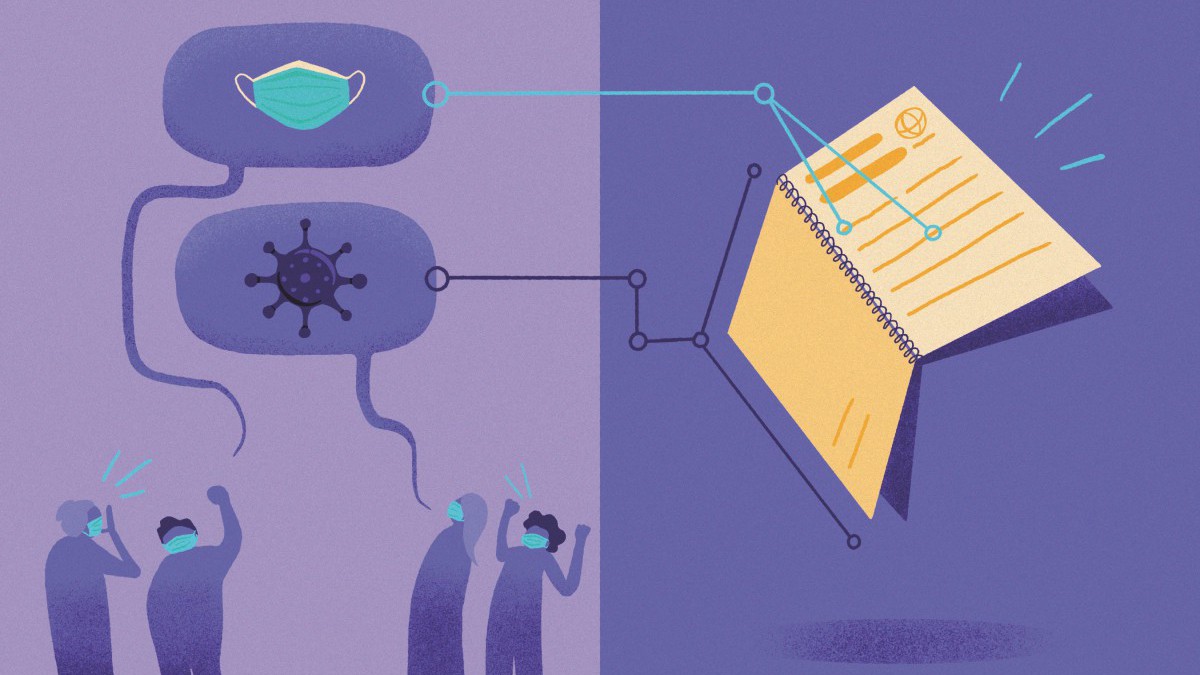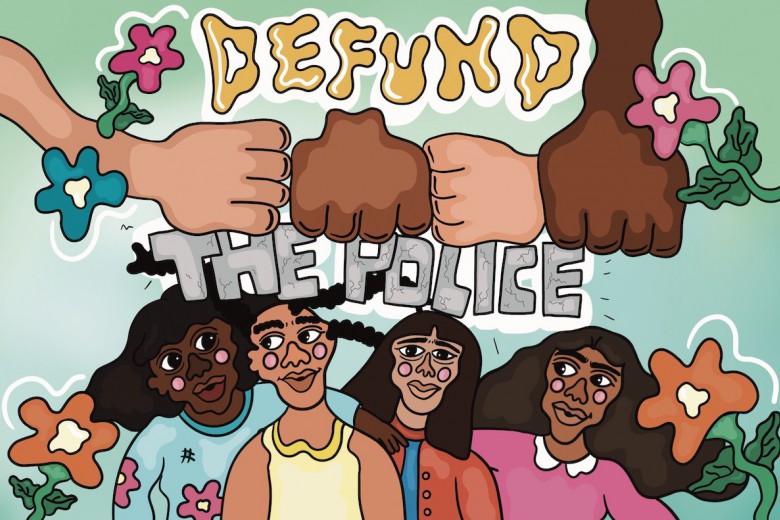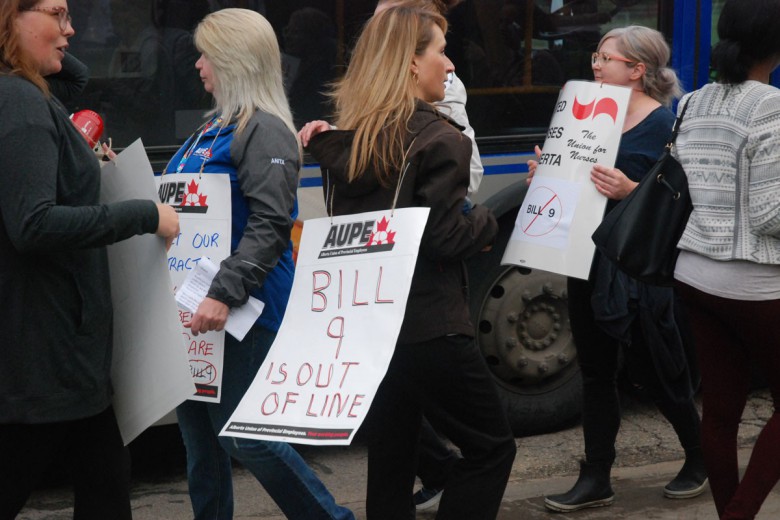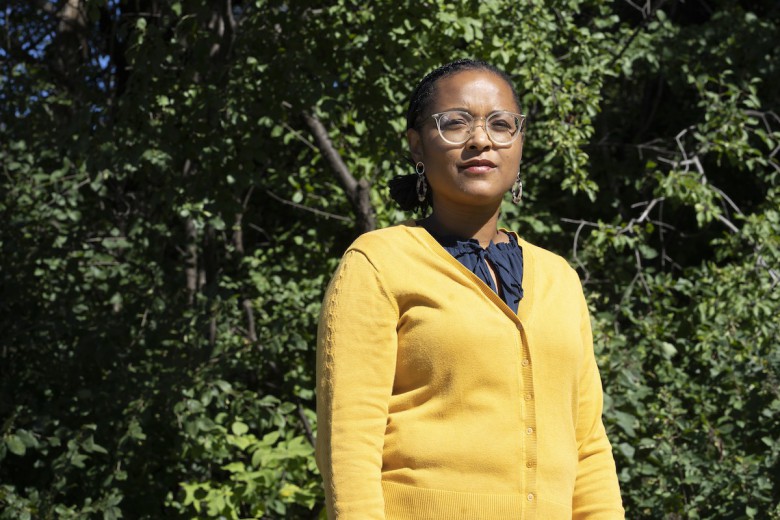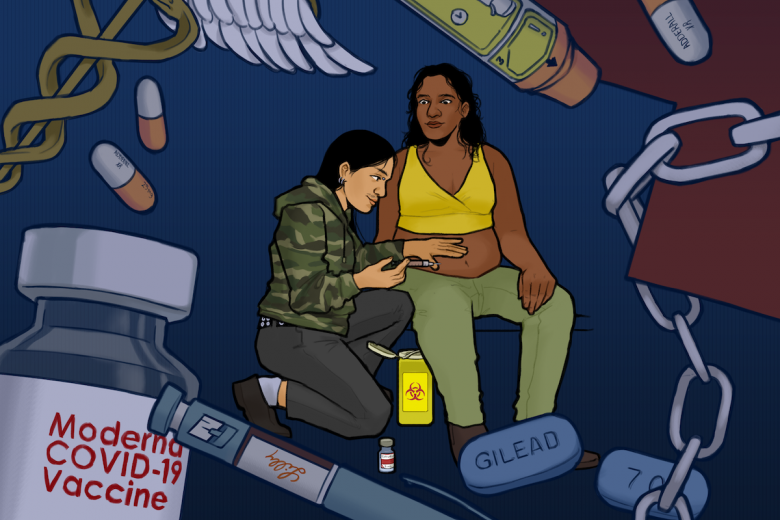In March 2022, unionized faculties across Ontario’s college system held our collective breath. The College Employer Council, which represents the employer side of 24 Ontario public colleges, had been bargaining with us since July 2021. By November, negotiations had completely broken down and we spent the winter engaged in a work-to-rule action, refusing all forms of uncompensated, unnegotiated work. Four months later, in March 2022, our bargaining team called for a strike.
As college professors committed to radical education, we – griffin and kate – wanted to strike. We knew that only a show of collective power would help us win better learning conditions for our students. But we are also disabled and living through a global pandemic that disproportionately affects marginalized people. We wondered – what would an accessible strike look like under these conditions? How would our union work against the ableism that has been so rampant throughout the pandemic?
T.L. Lewis defines ableism as “a system of assigning value to peoples’ bodies and minds” that shapes who is seen as able to work and who is worthy of protection. This system both comes from and reinforces anti-Blackness, misogyny, colonialism, imperialism, and capitalism.
14.8 per cent of Canadian adults who had COVID (1 in 20 Canadians of working age) suffer from long COVID symptoms that affect their daily lives.
The day before the strike, our local instructed members to picket outside our college’s downtown campus for 20 hours per week, with no mention of masks, social distancing, or remote alternatives. As disability justice organizers, we knew these ableist strike practices would leave many members behind, including us.
We had been living in a pandemic for two years and bargaining for nine months. Hadn’t there been time for our union to make sure that collective action would truly be collective? That no one would be put in danger or left behind?
After this experience, we wondered how many other workers were facing the same issues in their own unions. It wasn’t easy to find people doing labour organizing using a disability justice lens. We spoke to four unionized workers seeking COVID-19 protections at their workplaces, and they shared their experiences advocating for COVID safety at work. Like us, they found it difficult to organize for collective safety within their union’s traditional structures. But they did have inspiring ideas for how to mobilize more people to take COVID protection seriously as a matter of solidarity.
“It was not something that had broad, active support”
In Ontario, the first few months of 2022 marked what Beatrice Adler-Bolton and Artie Vierkant call “the sociological production of the end of the pandemic.” Despite high case counts, the provincial government rolled back COVID safety precautions over March and April, and by June had removed almost all protective measures. Politicians also pivoted from the language of “collective safety” to that of “personal choice,” shifting the responsibility to individuals to keep themselves safe from COVID.
These changes to the public conversation about COVID made traditional labour organizing difficult, according to Mark Feltham, president of OPSEU Local 110. Unions often fight for issues with widespread membership support, but two years into the pandemic, many workers were no longer invested in organizing for protections like mandatory masking. “People think they’re immune,” he shares.
When Feltham’s employer, Fanshawe College, repealed its mask and vaccine policies in August 2022, he realized it would be important to build a small, dedicated team of like-minded allies to work toward establishing collective safety. He decided to initiate a group grievance claiming that the institution was violating Ontario’s Health and Safety Act by failing to “take every precaution reasonable in the circumstances for the protection of a worker.”
“We just didn’t take ‘no’ for an answer. These are the things that we need in order to be able to do our job.”
Feltham chose a targeted approach to recruit fellow grievers, opting to spread the word among people he knew were already invested in COVID safety and offer them the chance to join in. Additionally, he did media outreach about the grievance highlighting the importance workplace COVID safety matters to the broader public – as Feltham puts it, “we wanted to communicate to the world what we were doing, because this is an issue of public interest.”
Reflecting on these experiences, Feltham argues that it’s important to treat equity and safety issues as a matter to organize around instead of something to put to a vote. “The big question,” he says, “is how do you reach all the people who are not masking, who do not want to engage in these issues? […] COVID brought deep-seated [societal] divisions into the foreground. Whenever peoples’ perspectives are challenged in that way, that’s when you get massive retrenchment.” As of this writing, Local 110’s masking grievance is awaiting arbitration.
Feltham wasn’t the only one noticing a lack of energy among union members to fight for COVID protections. In early 2022, a small, passionate segment of the University of Manitoba Faculty Association’s (UMFA) membership launched the Safe Air UM campaign, demanding better ventilation, free rapid antigen tests, and the maintenance of existing mask and vaccination mandates. But according to David Camfield, a member of UMFA’s Organizing and Communications Committee, it was difficult to build momentum.
“Just because the collective agreement doesn’t say anything meaningful about [an issue] doesn’t mean we shouldn’t use the union as an organization through which we can build some power to have an impact.”
“It was clear a minority was very concerned,” he explains. “But it was not something that had the broad, active support of the membership.” Camfield assumes that workers’ disinterest might have reflected a general hopelessness caused by the Manitoba government’s abandonment of COVID safety measures.
Surprisingly, despite these challenges, the University of Manitoba decided to retain its mask mandate, one of few Canadian universities to do so, though compliance with the mandate has dropped according to a student interviewed by the Winnipeg Free Press. Camfield believes the university’s decision to keep the mandate was due to a number of factors, including the Safe Air UM campaign.
“We had to take up the fight,” Camfield says. Historically, UMFA’s demands have largely focused on wage issues; Camfield believes fighting for COVID safety measures helped UMFA members understand that the kinds of issues a union can stand for, and the definition of “what ‘union’ means” in general, are far broader than they might have imagined.
“Just because the collective agreement doesn’t say anything meaningful about [an issue] doesn’t mean we shouldn’t use the union as an organization through which we can build some power to have an impact,” Camfield shares.
“We just didn’t take ‘no’ for an answer”
While established unions struggled to move beyond tried-and-true tactics, workers at Steamworks Baths, a newly unionized private gay sauna in Toronto, used COVID as a rallying point.
When capacity limits for sex clubs and bathhouses were announced in July 2021, Graeme Lamb says his manager at Steamworks tried to lie about the facility’s actual capacity, often screaming at workers and threatening them with termination for enforcing the correct limits.
As Lamb describes: “People were having panic attacks at the thought of coming in to work because they’re scared of having to make the choice between […] the legally binding guidelines that are there to keep people safer, or [having] a ‘non-screaming-match day.’”
During this time, employees found strength in collective action. Lamb believes the tensions created by the pandemic were the catalyst workers needed to unionize.
“We need a certain amount of power to take action on the administration, and that will only come from a large number of the members being prepared to take action.”
Before the pandemic, many workers believed management was on their side, but how they were being treated proved that that was not the case. “Being screamed at by your boss and threatened with termination for trying to follow the law […] makes things clear,” Lamb shares.
Once workers filed their application with the Labour Relations Board and won the certification vote, their employer ended the harassment campaign and agreed to improved safety practices, including proper gloves for cleaning and a continued commitment to providing masks.
Steamworks workers had long advocated for personal protective equipment, which had become doubly important because of COVID. Unionizing during a pandemic meant that organizers didn’t need to pivot toward focusing on health and safety: from the start, it was the first priority.
Workers at Steamworks aren’t the only ones who rallied around COVID safety to improve their working conditions. Ana, who asked to use a pseudonym, and her co-workers at an Ontario non-profit organization saw the pandemic as an opportunity to make bargaining more inclusive and worker-driven.
Bargaining meetings are traditionally quite formal, hierarchical, and governed by decision-making processes that require training to navigate. As bargaining neared, to make the process easier for members, the team held casual weekly online meetings, encouraging staff to talk through core issues, fears, and desires.
If unions are truly committed to leaving no one behind, they need to move beyond the liberal disability framework of individual accommodations and toward collective access in service of collective liberation.
The more personable approach used by the organization’s team resulted in contract demands that came directly from workers and addressed their needs, like remote work options and a broader definition of what circumstances – beyond only legally defined disability – might result in a worker needing an accommodation.
At first, the union pushed back on these demands due to lack of precedent. But, as Ana notes, “We just didn’t take ‘no’ for an answer. These are the things that we need in order to be able to do our job,’” she says.
Eventually, the union acceded. Many unions have never dealt with a pandemic before, and Ana recognizes this as a moment of growth for all involved. “They don’t know how to fight for this,” she shares. “And our attitude was: ‘There’s only one way to find out. So, let’s get on it.’”
A turning point
As we enter year four of the pandemic, the labour movement is at a turning point. Despite all-time high workplace absences due to illness, it remains nearly impossible to “establish work-relatedness” in workplace safety and insurance claims prompted by getting COVID in the workplace. Meanwhile, an increasing number of people are becoming disabled – Statistics Canada estimates that 14.8 per cent of Canadian adults who had COVID (1 in 20 Canadians of working age) suffer from long COVID symptoms that affect their daily lives.
Are unions ready to support an increasingly disabled workforce? As disabled workers, we’re not convinced. In 2021 and 2022, CUPE workers destroyed encampments that unhoused people, many of whom are disabled, called home. Our union, OPSEU, includes prison guards who enforce an incarceration system that disables people at astronomical rates. As these examples and scholar Liat Ben-Moshe make clear, unions in North America often reinforce ableism and other linked forms of structural violence in the name of preserving jobs.
In the end, we didn’t go on strike in March 2022. At the eleventh hour, the College Employer Council agreed to binding arbitration, a dispute resolution mechanism the union had suggested many months before. In many ways, this was a victory – our actions forced the employer to come back to the bargaining table.
Many unions have never dealt with a pandemic before.“They don’t know how to fight for this,” Ana shares. “And our attitude was: ‘There’s only one way to find out. So, let’s get on it.”
For us, the ableism of the strike also opened a door for new kinds of action. In the late spring of 2022, we created a worker-led group called College Workers for Access to engage in more accessible and creative forms of mutual aid, agitation, and disruption. This group has been meeting monthly since August 2022, building community, raising political consciousness, and laying the foundation for collective action among college workers who are being endangered by their employers mandating in-person work.
If unions are truly committed to leaving no one behind, they need to move beyond the liberal disability framework of individual accommodations and toward collective access in service of collective liberation, as outlined by Sins Invalid, a performance project that was one of the catalysts of the contemporary disability justice movement.
As Camfield puts it, “we need a certain amount of power to take action on the administration, and that will only come from a large number of the members being prepared to take action.” Preparing workers for action around a global health crisis must begin by proactively combating ableism in the workplace and in unions themselves. This can only happen through deep, democratic dialogue: educating abled workers about disability justice while listening to disabled workers and welcoming us to lead the way forward using the wisdom we have gained from surviving a pandemic.


